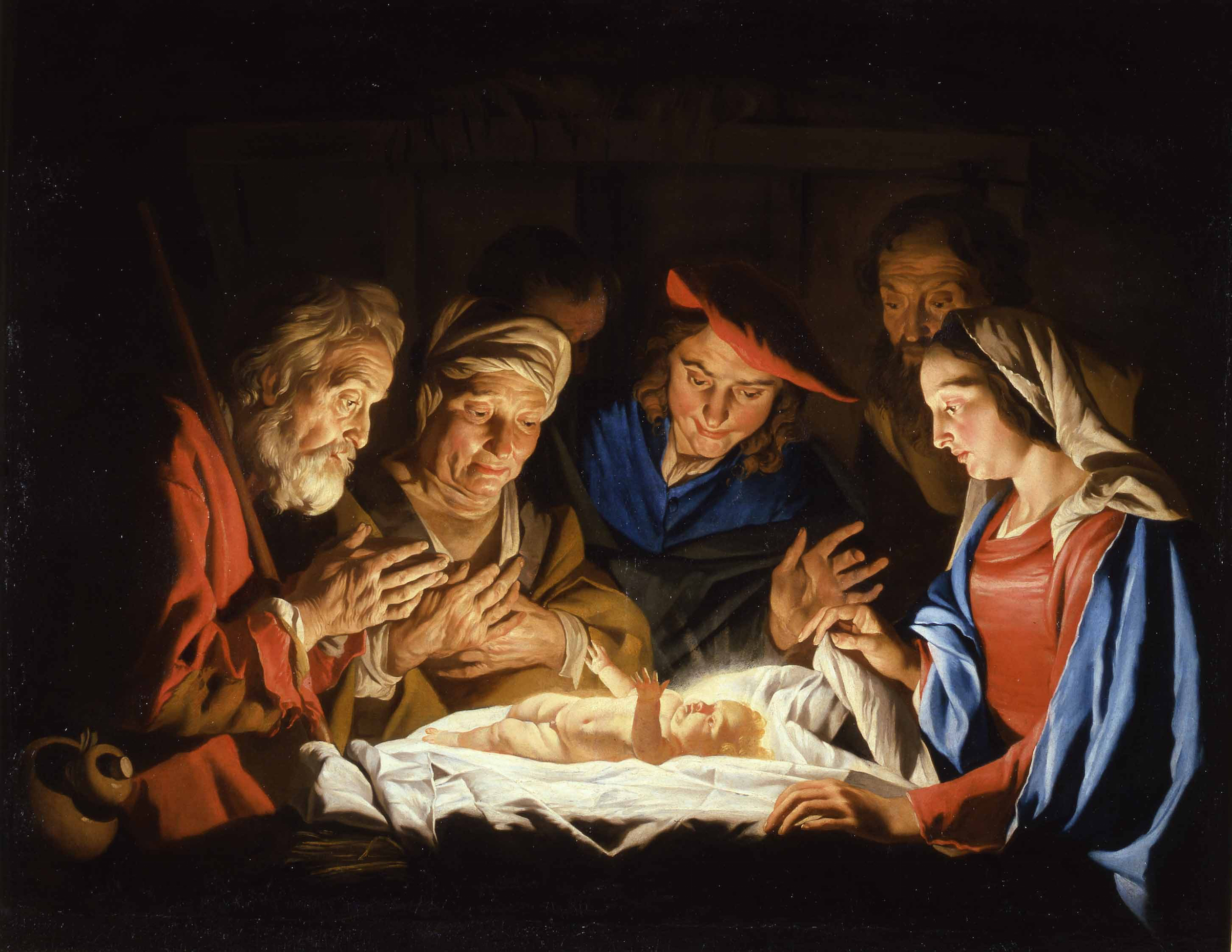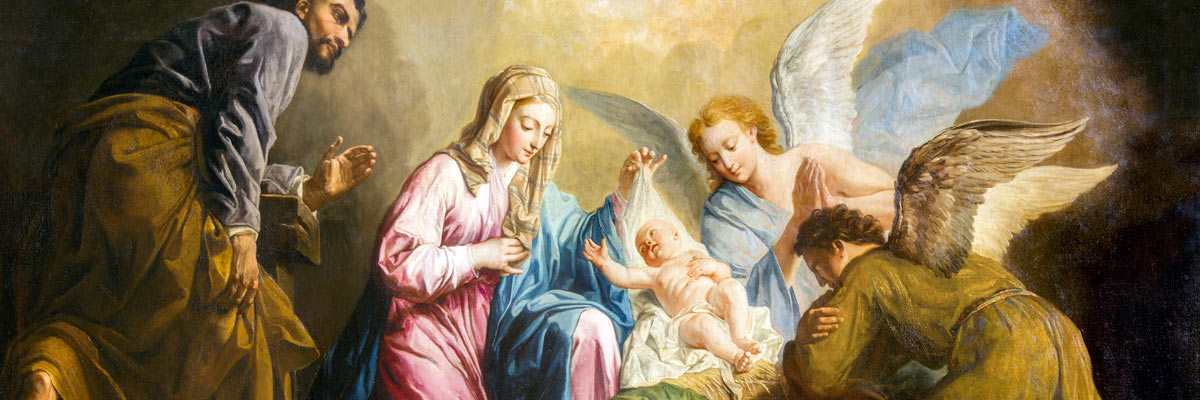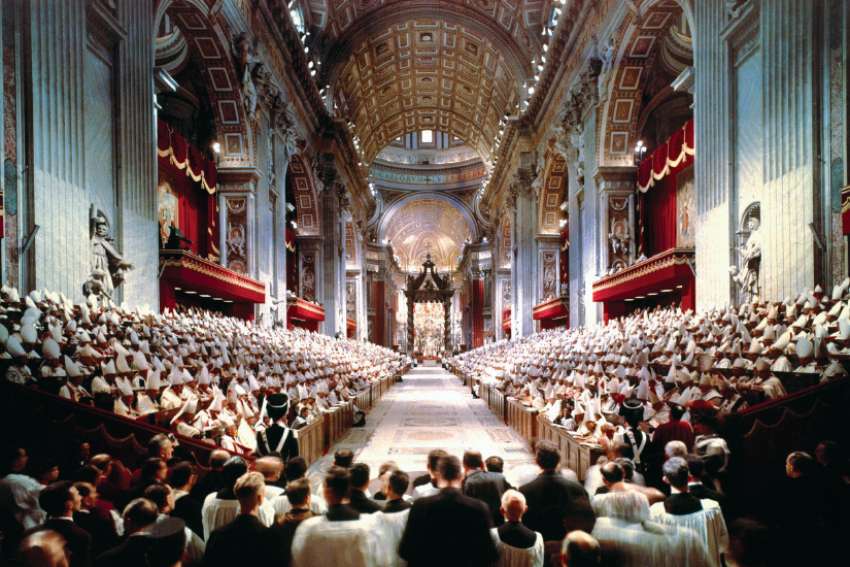
Taken from Mary of Agreda’s “Mystical City of God,” we receive profound insights into the wise men’s meeting with the Holy Family. A most beautiful must-read account, during this Epiphany-tide.
On leaving Jerusalem the Magi again found the star, which at their entrance they had lost from view. By its light they were conducted to Bethlehem and to the cave of the Nativity. Diminishing in size it hovered over the head of the Infant Jesus and bathed Him in its light; whereupon the matter of which it had been composed dissolved and disappeared. Our great Queen had already been prepared by the Lord for the coming of the Kings, and when She understood that they were approaching the cave, She requested Saint Joseph not to leave it, but to stay at Her side. This he did, although the sacred text does not mention it. Like many other things passed over in the Gospels, this was not necessary for establishing the truth of the mystery. Nevertheless, it is certain that Saint Joseph was present when the Kings adored the infant Jesus. The precaution of sending him away was not necessary; for the Magi had already been instructed that the Mother of the Newborn was a Virgin, and that He was the true God and not a son of Saint Joseph. Nor would God have permitted them to be led to the cave ignorant of such an important circumstance as His origin, allowing them to adore the Child as the son of Joseph and of a Mother not a Virgin. They were fully instructed as to all these things, and they were deeply impressed by the sacramental character of all these exalted and complicated mysteries.
The heavenly Mother awaited the pious and devout kings, standing with the Child in Her arms. Amid the humble and poor surroundings of the cave, in incomparable modesty and beauty, She exhibited at the same time a majesty more than human, the light of Heaven shining in Her countenance. Still more visible was this light in the Child, shedding through the cavern effulgent splendor, which made it like a heaven. The three kings of the East entered and at the first sight of the Son and Mother they were for a considerable space of time overwhelmed with wonder. They prostrated themselves upon the earth, and in this position they worshiped and adored the Infant, acknowledging Him as the true God and man, and as the Savior of the human race. By the divine power, which the sight of Him and His Presence exerted in their souls, they were filled with new enlightenment. They perceived the multitude of angelic spirits, who as servants and ministers of the King of kings and Lord of lords attended upon Him in reverential fear (cf. Heb. 1:6). Arising, they congratulated their and our Queen as Mother of the Son of the eternal Father; and they approached to reverence Her on their knees. They sought Her hand in order to kiss it, as they were accustomed to do to their queens in their countries. But the most prudent Lady withdrew Her hand, and offered instead that of the Redeemer of the world, saying: “My spirit rejoices in the Lord and My soul blesses and extols Him; because among all the nations He has called and selected you to look upon and behold that which many kings and prophets have in vain desired to see (cf. Luke 10:24), namely, Him Who is the eternal Word Incarnate (cf. John 1:1-3, 14). Let us extol and praise His Name on account of the sacraments and mysteries wrought among His people; let us kiss the earth which He sanctifies by His Real Presence.”
At these words of most holy Mary, the three kings humiliated themselves anew, adoring the Infant Jesus; they acknowledged the great blessings of living in the time when the Sun of justice was arising in order to illumine the darkness (cf. Mal. 4:2). Thereupon they spoke to Saint Joseph, congratulating him and extolling his good fortune in being chosen as the spouse of the Mother of God; and they expressed wonder and compassion at the great poverty, beneath which were hidden the greatest mysteries of Heaven and earth. In this intercourse they consumed three hours, and then the kings asked permission of most holy Mary to go to the city in order to seek a lodging, as they could find no room for themselves in the cave. Some people had accompanied them; but the Magi alone participated in the light and the grace of this visit. The others took notice merely of what passed exteriorly, and witnessed only the destitute and neglected condition of the Mother and Her husband. Though wondering at the strange event, they perceived nothing of its mystery. The Magi took leave and departed, while most holy Mary and Joseph, being again alone with their Child, glorified His Majesty with new songs of praise, because His Name was beginning to be known and adored among the Gentiles (cf. Ps. 85:9)…
Holy Conversation Amongst Themselves
From the grotto of the Nativity, into which the three Kings had entered directly on their way to Jerusalem, they betook themselves to a lodging inside of the town of Bethlehem. They retired to a room where, in an abundance of affectionate tears and aspirations, they spent the greater part of the night, speaking of what they had seen, of the feelings and affections aroused in each, and of what each had noticed for himself in the Divine Child and His Mother. During this conference they were more and more inflamed with divine love, amazed at the majesty and divine effulgence of the Infant Jesus; at the prudence, modesty and reserve of His Mother; at the holiness of Her spouse Joseph, and the poverty of all three; at the humbleness of the place, where the Lord of Heaven and earth had wished to be born. The devout kings felt a divine fire, which flamed up in their hearts, and, not being able to restrain themselves, they broke out into exclamations of sweet affection and acts of great reverence and love. “What is this that we feel?” they said. “What influence of this great King is it that moves us to such desires and affections? After this, how shall we converse with men? What can we do, who have been instructed in such new, hidden and supernatural mysteries? O greatness of His Omnipotence unknown to men and concealed beneath so much poverty! O humility unimaginable for mortals! Would that all be drawn to it, in order that they may not be deprived of such happiness!”
During these divine colloquies the Magi remembered the dire destitution of Jesus, Mary and Joseph in their cave, and they resolved immediately to send them some gifts in order to show their affection and to satisfy their desire of serving them, since they could not do anything else for them. They sent through their servants many of the presents, which they had already set aside for them, and others which they could procure. Most holy Mary and Joseph received these gifts with humble acknowledgment and they made a return not of empty-worded thanks, as other men are apt to make, but many efficacious blessings for the spiritual consolation of the three Kings. These gifts enabled our great Queen to prepare for Her ordinary guests, the poor, an abundant repast; for the needy ones were accustomed to receive alms from Her, and, attracted still more by Her sweet words, were wont to come and visit Her. The Kings went to rest full of incomparable joy in the Lord; and in their sleep the angels advised them as to their journey homeward.
Second Encounter, Bestowal of the Gifts
On the following day at dawn they returned to the cave of the Nativity in order to offer to the heavenly King the special gifts which they had provided. Arriving they prostrated themselves anew in profound humility; and opening their treasures, as Scripture relates, they offered Him gold, incense and myrrh (cf. Matt 2:11). They consulted the heavenly Mother in regard to many mysteries and practices of faith, and concerning matters pertaining to their consciences and to the government of their countries; for they wished to return well instructed and capable of directing themselves to holiness and perfection in their daily life. The great Lady heard them with exceeding pleasure and She conferred interiorly with the Divine Infant concerning all that they had asked, in order to answer and properly to instruct these sons of the new Law. As a Teacher and an instrument of divine wisdom, She answered all their questions, giving them such high precepts of sanctity that they could scarcely part from Her on account of the sweetness and attraction of Her words. However, an angel of the Lord appeared to them, reminding them of the necessity and of the will of the Lord that they should return to their country. No wonder that Her words should so deeply affect these Kings; for all Her words were inspired by the Holy Spirit and full of infused science regarding all that they had inquired and many other matters.
The heavenly Mother received the gifts of the Kings and in their name offered them to the Infant Jesus. His Majesty showed by signs of highest pleasure, that He accepted their gifts: they themselves became aware of the exalted and heavenly blessings with which He repaid them more than a hundredfold (cf. Matt. 19:29). According to the custom of their country, they also offered to the heavenly Princess some gems of great value; but because these gifts had no mysterious signification and referred not to Jesus, She returned them to the Kings, reserving only the gifts of gold, incense and myrrh. In order to send them away more rejoiced, She gave them some of the clothes in which She had wrapped the Infant God; for She neither had nor could have had any greater visible pledges of esteem with which to enrich them at their departure. The three Kings received these relics with such reverence and esteem that they encased them in gold and precious stones in order to keep them ever after. As a proof of their value these relics spread about such a copious fragrance that they revealed their presence a league in circumference. However, only those who believed in the coming of God into the world were able to perceive it; while the incredulous perceived none of the fragrance emitted by the relics. In their own countries the Magi performed great miracles with these relics.
Departure and Legacy
The holy Kings also offered their property and possession to the Mother of the sweetest Jesus, or, if She did not wish to accept of them and preferred to live in this place, where her most holy Son had been born, they would build Her a house, wherein She could live more comfortably. The most prudent Mother thanked them for their offers without accepting them. On taking leave of Her, the three Kings besought Her from their inmost hearts not to forget them, which She promised and fulfilled; in the same way they spoke to Saint Joseph. With the blessing of Jesus, Mary and Joseph, they departed, so moved by tenderest affection that it seemed to them they had left their hearts all melted into sighs and tears in that place. They chose another way for their return journey, in order not to meet Herod in Jerusalem; for thus they had been instructed by the angel on the preceding night (cf. Matt. 2:12). On their departure from Bethlehem, the same or a similar star appeared in order to guide them home, conducting them on their new route to the place where they had first met, whence each one separated to reach his own country.
For the rest of their lives these most fortunate Kings lived up to their divine vocation as true disciples of the Mistress of holiness, governing both their souls and the people of their states according to Her teaching. By the example of their lives and the knowledge of the Messias, which they spread about, they converted a great number of souls to the belief in the true God and to the way of salvation. Finally, full of days and merits, they closed their careers in sanctity and justice, having been favored both in life and in death by the Mother of mercy. After dismissing the Kings, the heavenly Queen and Saint Joseph spent their time in new canticles of praise of the wonders of the Most High, conferring them with the sayings of the Scriptures and the prophecies of the Patriarchs, which they saw fulfilled one after another in the Infant Jesus. But the most prudent Mother, who profoundly penetrated into the deepest meaning of these high sacraments, remembered them all and treasured them up in Her bosom (cf. Luke 2:19). The holy angels, who were witnesses of these holy mysteries, congratulated their Queen, that Her most holy Son had been manifested and that His Majesty had been adored by men; and they sang to Him new canticles, magnifying His mercies wrought upon mankind…
Postscript: Concerning the gifts offered by the Magi, Mary and Joseph decided to divide them into three parts: one destined for the temple of Jerusalem, namely the incense and myrrh, as well as part of the gold; another part as offering to the priest, who had circumcised the Child, in order that he might use it for himself and for the synagogue or oratory in Bethlehem, and the third part for distribution among the poor. This resolve they executed with generous and fervent affection.










